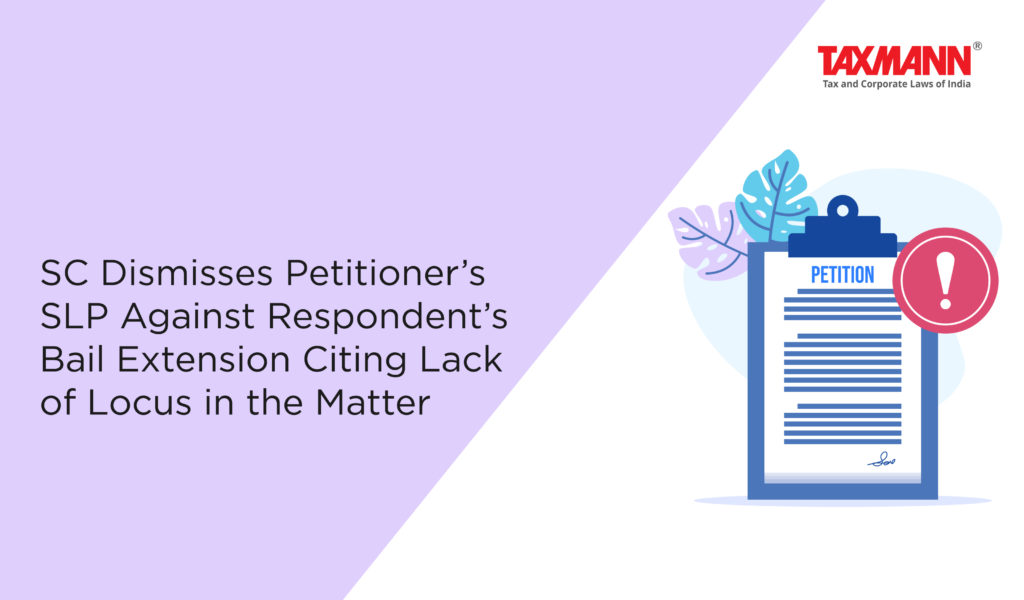SC Dismisses Petitioner’s SLP Against Respondent’s Bail Extension Citing Lack of Locus in the Matter
- Blog|News|Insolvency and Bankruptcy Code|
- 2 Min Read
- By Taxmann
- |
- Last Updated on 17 June, 2023

Case Details: Gluckrich Capital (P.) Ltd. v. State of West Bengal - [2023] 150 taxmann.com 540 (SC)
Judiciary and Counsel Details
-
- Krishna Murari & Ahsanuddin Amanullah, JJ.
- Ms Vanshaja Shukla, Adv. & Ms Anzu. K. Varkey, AOR for the Appellant.
- Karan Bharioke, Adv. & Ashish Batra, AOR for the Respondent.
Facts of the Case
In the instant case, the Corporate Insolvency Resolution Process (CIRP) was initiated against the corporate debtor. During pendency of insolvency proceedings before NCLT, an order was passed directing Resolution Professional (RP) not to proceed with approval of resolution plan.
Meanwhile, the financial creditor lodged FIR against respondent no 3 to 5, who were suspended directors of corporate debtor. Thereafter, respondent no. 3 to 5 filed a writ before the High Court challenging FIR lodged against them.
The High court by order extended transit anticipatory bail granted to respondents. Consequently, the Petitioner (unsecured financial creditor) of the corporate debtor filed an instant petition before Supreme Court challenging interim order of High Court.
The Petitioner alleged that he was an interested party to challenge extension of anticipatory transit bail granted to respondents against which insolvency proceedings were pending under Insolvency and Bankruptcy Code, 2016 (IBC, 2016).
Supreme Court Held
The Apex Court was of view that the petitioner was neither informant nor a party to proceedings pending before High Court and was totally unconnected with FIR lodged by financial creditors.
The Apex Court held that the petitioner had no locus in matter and thus, special leave petition filed by petitioner was to be dismissed.
Disclaimer: The content/information published on the website is only for general information of the user and shall not be construed as legal advice. While the Taxmann has exercised reasonable efforts to ensure the veracity of information/content published, Taxmann shall be under no liability in any manner whatsoever for incorrect information, if any.

Taxmann Publications has a dedicated in-house Research & Editorial Team. This team consists of a team of Chartered Accountants, Company Secretaries, and Lawyers. This team works under the guidance and supervision of editor-in-chief Mr Rakesh Bhargava.
The Research and Editorial Team is responsible for developing reliable and accurate content for the readers. The team follows the six-sigma approach to achieve the benchmark of zero error in its publications and research platforms. The team ensures that the following publication guidelines are thoroughly followed while developing the content:
- The statutory material is obtained only from the authorized and reliable sources
- All the latest developments in the judicial and legislative fields are covered
- Prepare the analytical write-ups on current, controversial, and important issues to help the readers to understand the concept and its implications
- Every content published by Taxmann is complete, accurate and lucid
- All evidence-based statements are supported with proper reference to Section, Circular No., Notification No. or citations
- The golden rules of grammar, style and consistency are thoroughly followed
- Font and size that’s easy to read and remain consistent across all imprint and digital publications are applied



 CA | CS | CMA
CA | CS | CMA
